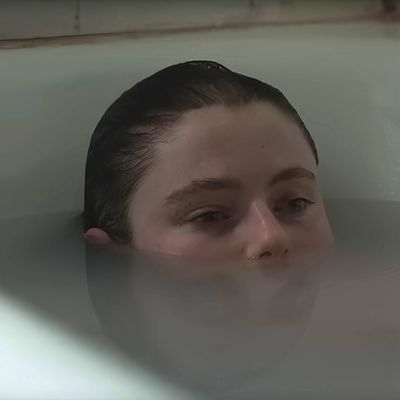
Ottessa Moshfegh’s writing is notable for its resolute prickliness. She favors narrators who stridently hate everyone around them and notice other people’s foibles with vicious acuity. She has a penchant for describing bodily functions in extreme and exacting detail and is an expert in creating an aura of pervading menace. You will find all of these things in her 2015 novel Eileen, but the new movie adaptation of the book — despite being co-written by the author and her partner, Luke Goebel — is another story. The film keeps the air of menace but dispenses, unfortunately, with the other things, which were what made the novel more than just a story about a weird girl who falls in with another weirdo and ends up doing a crime.
Eileen, the film, is set in 1964, the week leading up to Christmas in a small seaside town in Massachusetts. Eileen lives with her father, a depressive drunk, in a house filthily untouched since her mother’s death years prior. She works as a secretary at a penitentiary for boys called Moorehead, has no friends, and is given to violent masturbatory fantasies involving a particular prison guard. She does creepy things like drive up to a make-out spot and, after watching couples humping in other cars, thrust a handful of snow down her pants.
Because there’s no narration, we have no idea why she does these things and could be forgiven for wondering why she doesn’t just hop in her car and drive until the grubby town and her threatening father are far behind her. Instead of the book’s near-claustrophobic interiority we only get a lot of lingering shots of Thomasin McKenzie, who plays Eileen, blank-faced and, we assume, thinking dark thoughts. Only occasionally do we see her growling and slapping herself in the mirror as she attempts to exude normality.
It’s not McKenzie’s fault that she’s given so little to work with, but I missed the novel’s granular attention to Eileen’s obsession with her own body, which she perceives as maximally unclean and embarrassing, even as she can’t stop poking, prodding, and manipulating it. Some of the most memorable moments in the book pertain to Eileen’s reliance on laxatives, and the dramatic results of her purges. “With the laxatives, my movements were torrential, oceanic, as though all of my insides had melted and were now gushing out, a sludge that stank distinctly of chemicals and, which, when it was all out, I half expected to reach the brim of the toilet bowl,” reads one indelible passage. Perhaps this was rightly deemed unfilmable, but when you strip Eileen of her ritualistic mortifications of her own flesh, you strip her of a lot of what makes her distinct. All we get of bodily grossness, and only briefly, is a scene of Eileen in bed, chewing up chocolates and then spitting them back out into the wrappers. So she’s a little bit icky but not nearly as fully, gloriously disgusting as she is in the novel. (I would be remiss if I didn’t mention a later scene where she wakes up hungover in her car in a puddle of her own vomit, but one vomit puddle doesn’t nearly compare to how much vomit there is in the book.)
We also only get only the vaguest sense of Eileen’s contempt for the child prisoners kept in the institution where she works. In the novel, her uncaring is explicit. She either sexualizes the prisoners or feels nothing for them, even as she sees them being abused by the guards. She dismisses these sights as soon as she witnesses them. “If anyone was trapped and suffering and abused, it was me. I was the only one whose pain was real. Mine.” Film Eileen is plausibly likable. Book Eileen is a bit of a monster.
The film wanders fitfully through Eileen’s barren life until the arrival, about halfway through, of a new prison psychologist, Rebecca, played by Anne Hathaway, who seems to be channeling Cate Blanchett in Carol. She’s beautiful, she smokes dramatically, and she talks like a movie star. Improbably, Rebecca takes an interest in Eileen, who responds because no one ever has before. They spend a night out at the town’s one bar, slow-dancing and drinking martinis, and Eileen feels her dull life transforming. After this, the laconic pace of the film speeds up considerably; Rebecca becomes the engine of Eileen’s somewhat pathetic attempt at self-transformation. She dresses more carefully for work the next day, and observes Rebecca take an interest in a particular inmate’s case, a boy named Lee Polk who is in prison for slitting his father’s throat.
As it happens, Polk’s case is the crux of the speedy final act of the film. Rebecca invites Eileen to spend Christmas Eve with her, but when Eileen arrives Rebecca is behaving erratically, which Eileen initially chalks up to her own awkwardness. It turns out, though, that they’re in the Polks’ house, where Rebecca has somewhat inexplicably tied up Mrs. Polk in the basement in the hopes of making her confess to the abuses that prompted her son’s patricide. Despite her outward appearance of glamor and normality, Rebecca turns out to be as nutty as Eileen — maybe more so. I won’t spoil what happens next, though the novel spoils it from the beginning because it’s narrated by a much older Eileen. Without that narration, the film’s climactic action seems to come from nowhere.
When Moshfegh’s novel was nominated for the Man Booker Prize in 2016, she told an interviewer she wrote the book with fame and profit foremost in mind: “Because there are all these morons making millions of dollars, so why not me? I’m smart and talented and motivated and disciplined.” She bought a book called The 90-Day Novel and set out to write a noir thriller, a palatable container for her writing’s unconventional aspects: “I couldn’t be like, Here’s my freak book … So I’ve disguised the ugly truth in a kind of spiffy noir package.” But instead of playing with the format of convention, as Moshfegh said she set out to do with the book, the film hews to convention completely, stripping away the literary aspects so that only genre is left.
It’s impossible to translate exactly from the page to the screen, but I wished for the film version of Eileen to linger atmospherically. Or even, failing that, I wished for a few more fantasy sequences and a lot more poop. Either one would have gone a long way towards making Eileen a worthy counterpart to its exquisite source material.


